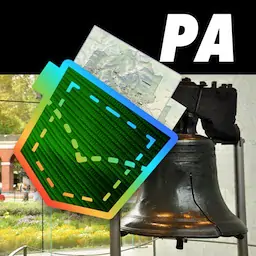"The beautiful and serene Ramsey Farm in Beaver Valley." by NPS Photo , public domain
BrochureFirst State |
Official Brochure of First State National Historical Park in Delaware and Pennsylvania. Published by the National Park Service (NPS).
featured in
| National Parks Pocket Maps |  | |
| Pennsylvania Pocket Maps |  |
First State
For more than 300 years,
on a fraught and uneven course, people in Delaware have
worked to pursue human rights and self-determination
for themselves and others. As with the nation as a whole,
the journey has never been straightforward. Questions
and contradictions in the First State story expose threads
of conflict, personal motivations of altruism and self-
National Park Service
U.S. Department of the Interior
National Historical Park
Delaware / Pennsylvania
New Castle Court House Museum
ALL PHOTOS—NPS / MARK MUSE UNLESS OTHERWISE CREDITED
interest, and social forces that shaped a centuries-long
pursuit for civil and human rights. Today, First State
National Historical Park encompasses places and events
related to the founding of the nation, the ratification of
the US Constitution—and well beyond. The story evolves
as each new generation finds its voice.
Colony to Constitution
The 1500s saw big European
powers competing for empire
and colonizing the Americas.
By the 1600s and early 1700s
they were sending a steady
stream of colonists to what
are now New Jersey and
Pennsylvania. Swedes, Dutch,
and Finns left their home
countries to pursue economic
prosperity in the region,
building forts and settlements
along the Delaware Bay and
river. The newcomers
encountered the Lenape
people and soon adopted
their travel networks over
local waterways. In 1681 King
Charles II of England granted
William Penn land in
Pennsylvania, including the
“Lower Three Counties” on
the west bank of Delaware
Bay. Penn’s colony became a
refuge for the persecuted
The Lenape people had
long inhabited the MidAtlantic region and in
the 1860s were moved
to Oklahoma. Jennie
Bobb and Nellie Longhat
are shown there in 1915.
Society of Friends (Quakers).
Unlike other colonial
governors, Penn extended
freedom of religion to
outsiders. The three Delaware
counties grew to resent
Pennsylvania’s Quaker-led
assembly and in 1704
established their own
legislature in New Castle.
John Dickinson was a
Continental Congress
delegate, primary author
of the Articles of Confederation, and drafter
and signer of the US
Constitution. Enslaved
and free laborers were
at his Poplar Hall estate
(shown below in part).
During the American
Revolution the state capital
moved to Dover. In December
1787 state legislators met at
the Golden Fleece Tavern on
The Dover Green to ratify
the US Constitution, making
Delaware the First State. The
new constitution would soon
face a series of challenges.
COURTESY INDEPENDENCE NHP
NATIONAL ANTHROPOLOGICAL ARCHIVES /
SMITHSONIAN INSTITUTION
The Constitution Tested
In the first decades of the
1800s the issue of slavery
divided the nation. Delaware’s
northern border marked the
frontier between slave states
and free states, securing its
role in human migration and
self-emancipation efforts that
became known as the
Underground Railroad.
Its most famous conductor,
Harriet Tubman, crossed the
state at least a dozen times
to shepherd freedom-seekers
north from Maryland’s
Eastern Shore. In 1857 a
group from Tubman’s home
county was betrayed in Dover
for a $3,000 reward. The
Dover Eight managed to
escape and elude capture.
In 1848 abolitionists Thomas
Garrett and John Hunn were
tried on federal charges at
the New Castle Court House
for violating the Fugitive
Slave Act. They were found
guilty and received hefty
fines. Garrett, formerly a
prosperous business owner,
was unrepentant and
continued his work.
Samuel Burris, a free
man from Philadelphia,
was captured in Dover in
1847 and convicted of
helping a woman escape
slavery in Delaware. He
was sentenced to seven
years of enslavement.
Abolitionists posing as
buyers rescued Burris on
the auction block.
NPS
In 1920 the First State played
a new role in constitutional
history. Only one more state
was needed to ratify the
Nineteenth Amendment,
granting women the vote.
Mabel Lloyd Ridgely, Florence
Bayard Hilles, and others
advocated tirelessly, but the
legislature declined to vote—
which counted as a “no.”
Hilles traveled to Tennessee
to work for passage there.
Two months later Tennessee
ratified the amendment, and
it became law on August 26.
Mabel Lloyd Ridgely,
1872–1962, suffragist
and preservationist,
raised money to restore
Delaware historical sites
like John Dickinson’s
Poplar Hall. Her house
on The Dover Green is
beside where The Golden Fleece Tavern stood.
DELAWARE PUBLIC ARCHIVES
Pro-suffrage rally on The Dover Green, 1920
NATIONAL WOMAN’S PARTY
Caring for Lands and Legacies
The story of William Bancroft
unfolds in the late 1800s and
early 1900s, when industry
was both the source of vast
fortunes and the cause of
wealth disparity. Bancroft’s
textile mills led to congested
urban conditions where
working families lacked access
to open space.
William Poole Bancroft
(1835–1928) came from
a family of Wilmington
industrialists. Quaker
values led him to
champion improved
conditions for factory
workers. A love of
nature inspired him to
improve access to lands
like Brandywine Valley
(background ).
In 1901 Bancroft set up the
charitable Woodlawn Trustees
to ensure affordable housing
and “wise development.” But
the benefits did not extend
to all. The group’s policies
segregated African Americans
in housing, schools, and other
institutions.
In part through acts of
conscience by Wilmington’s
Quakers, the trustees were
led to comply with federal
civil rights legislation. In 1972
the trustees adopted a
housing nondiscrimination
policy and implemented
changes a local newspaper
described as “a model of
integration.”
Delaware’s natural resources
were historically valued for
serving human needs. Today,
due to Bancroft and others,
they are shared with current
and future generations.
BACKGROUND—© MICHAEL MELFORD;
BANCROFT PORTRAIT—COURTESY
DELAWARE HISTORICAL SOCIETY
First State, Lasting Legacy
Established as a national monument in 2013
and a national historical park in 2014, First
State has six sites operated by state, local,
and nonprofit partners who provide visitor
programs and services. The park Welcome
Center and headquarters are in Historic New
Castle. Use the NPS App to guide your visit.
BRANDYWINE VALLEY
Brandywine Valley preserves over
1,300 acres of farms, winding
roads, forested hillsides, and
stream valleys characteristic of
northern Delaware and southern
Pennsylvania. This landscape
reveals evidence of 1700s English
Quaker settlements and the early
1900s conservationist vision of
Quaker industrialist William Poole
Bancroft.
ACCESSIBILITY We strive to make facilities,
services, and programs accessible to all.
Information for each site is on the website.
FOR YOUR SAFETY The park is a mix of
federal, state, local, and private property.
Respect owner privacy. • Be careful while
crossing streets and bicycling.
© MICHAEL MELFORD
Smith Bridge Picnic Area
Wilmington, DE 19803
www.nps.gov/frst
Emergencies call 911
MORE INFORMATION
First State National Historical Park
c/o Welcome Center
10 Market St.
New Castle, DE 19720
302-544-6363
www.nps.gov/frst
Follow us on social media.
npf_black.pdf
1
8/26/22
OLD SWEDES HISTORIC SITE
12:33 PM
Learn about national parks at www.nps.gov.
Join the park community.
www.nationalparks.org
IGPO:2023—423-201/83022 Last updated 2023
Old Swedes Church is one of the
oldest active congregations in the
nation. Descendants of original
Swedish colonists founded this
church in 1698. The black walnut
pulpit (far left) dates from the
church’s early years. The burial
ground’s 2,000 gravestones reveal
hundreds of years of history.
Operated by the Old Swedes
Foundation.
606 North Church St.
Wilmington, DE 19801
www.oldswedes.org
Brandywine Valley is
located in northern
Delaware, just south
of the Pennsylvania
border and west of U
S Highway 202.
Old Swedes Historic Site and Fort
Christina are located in Wilmington,
Delaware south of the Brandywine
Valley. The sites have Interstate 495 to
the east and Interstate 95 to the west.
Historic New Castle and
Welcome Center are located
to the south, along
Delaware road 41.
FORT CHRISTINA
Swedish and Finnish settlers
arrived at this spot on the
Christina River in 1638 and
named it for the Swedish queen.
The riverside community thrived
briefly until the rival Dutch, who
settled other parts of Delaware,
took control of the colony in
1655. Operated by the Kalmar
Nyckel Foundation.
1110 East 7th St.
Wilmington, DE 19801
www.kalmarnyckel.org
HISTORIC NEW CASTLE
New Castle served as Delaware’s
capital from 1707 to 1777. The
courthouse was home to the
Delaware legislature that voted
for independence from Great
Britain in 1776. The adjacent
Green has been a space for civic
gatherings for over 200 years.
Operated by the Delaware
Division of Historical and
Cultural Affairs.
New Castle Court House Museum
211 Delaware St.
New Castle, DE 19720
www.history.delaware.gov
The Dover Green is
located in Dover, along
U S Highway 13.
THE DOVER GREEN
John Dickinson
Plantation is located
along state road 1 and
southeast of The Dover
Green.
On December 7, 1787, state
delegates met on The Green at
the Golden Fleece Tavern (now
gone). At this meeting Delaware
became the first state to ratify
the US Constitution. Historic
buildings include the Old State
House (left). Operated by First
State Heritage Park.
First State Heritage Park
John Bell House
43 The Green
Dover, DE 19901
destateparks.com/History/
FirstStateHeritage
JOHN DICKINSON PLANTATION
A strong advocate for American
independence, John Dickinson
wrote eloquently of liberty.
Influenced by the Quakers,
Dickinson freed his enslaved
people by 1786. Operated by the
Delaware Division of Historical
and Cultural Affairs.
340 Kitts Hummock Rd.
Dover, DE 19901
www.history.delaware.gov
ALL IMAGES—NPS / MARK MUSE
UNLESS OTHERWISE CREDITED


